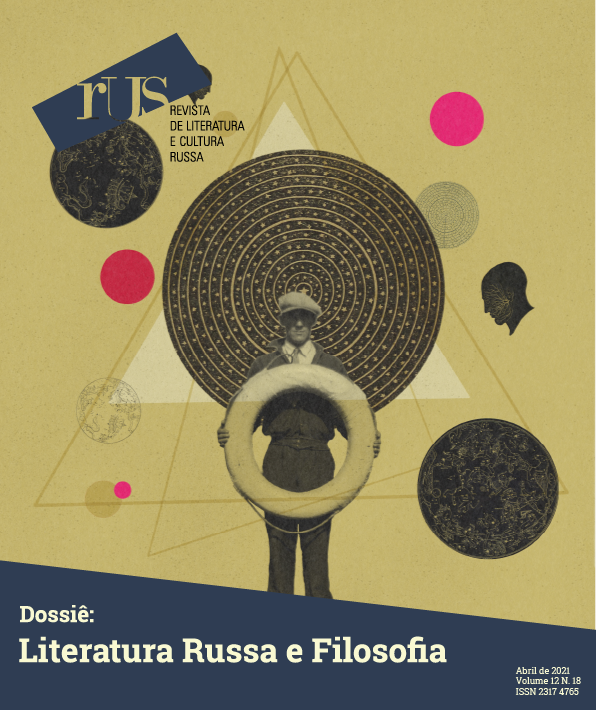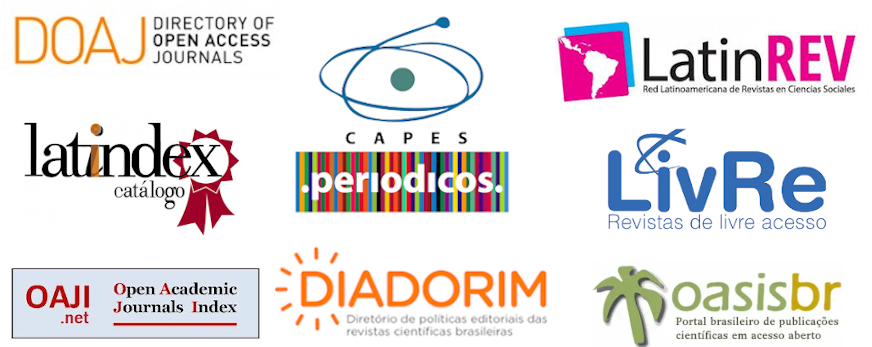The dog and the roulette: Kynismus, Zynismus and carnivalization in Dostoevsky’s The Gambler
DOI:
https://doi.org/10.11606/issn.2317-4765.rus.2021.181001Keywords:
Carnavalization, Dostoevsky, CynicismAbstract
Based on the ideas proposed by Bakhtin regarding carnivalization, a brief analysis of the novel The Gambler, published by Dostoevsky in 1867, is sought. Taking into account the strength that cynicism has in the origins of carnival literature, more specifically that of Lucian of Samosata, the tutor Alexei Ivanovich – narrator and protagonist of Dostoevsky’s novel – is analyzed with basis on this philosophical tradition. To this end, we resort not only to authors of the Antiquity, such as Luciano himself, but also to representatives of contemporary philosophy who ventured into reflections about Diogenes and other cynics: the Frenchman Michel Foucault and the German Peter Sloterdijk . It is based on the latter's ideas that Aleksey is proposed as the incarnation of the Cynic-Kynike dialectics that characterizes modernity.
Downloads
References
BAKHTIN, Mikhail. A cultura popular na Idade Média e no Renascimento: O contexto de François Rabelais. Tradução de Yara Frateschi Vieira. São Paulo/Brasília: HUCITEC/Editora da UnB, 1987.
BAKHTIN, Mikhail. Problems of Dostoevsky’s Poetics. Tradução para o inglês de Caryl Emerson. Minneapolis: University of Minnesota Press, 1984.
BRANDÃO, Jacyntho Lins. A poética do hipocentauro: literatura, sociedade e discurso ficcional em Luciano de Samósata. Belo Horizonte: Editora UFMG, 2001.
FOUCAULT, Michel. A coragem da verdade: O governo de si e dos outros II - curso dado no Collège de France (1983-1984). Tradução Eduardo Brandão. São Paulo: Martins Fontes, 2011.
FOUCAULT, Michel. De espaços outros. Estud. av., São Paulo , v. 27, n. 79, p. 113-122, 2013 . Disponível em <http://www.scielo.br/scielo.php?script=sci_arttext&pid=S0103-40142013000300008&lng=en&nrm=iso>. acesso em 25 Aug. 2020.
FOUCAULT, Michel. Le Courage de la vérité: le gouvernement de soi et des autres II. Paris: Gallimard, 2009.
HOLLAND, Philip. Robert Burton's Anatomy of Melancholy and Menippean Satire, Humanist and English. Ph.D. dissertation, University of London, 1979.
HUIZINGA, Johan. Homo ludens: o jogo como elemento da cultura. Trad. de João Paulo Monteiro. São Paulo: Editora Perspectiva, 2000.
IVANOV, Vjaceslav. Dostoevskij: Tragedia, Mito, Mistica. Tradução italiana de Ettore Lo Gatto. Bolonha: Editora Mulino, 1994.
LUCIANO. Luciano I: O sonho ou vida de Luciano; Diálogos das Cortesãs; Diálogos dos Deuses; Diálogos dos Deuses Marinhos; Diálogos dos Mortos; O Bibliómano Ignorante; e Alexandre, o Falso Profeta. Tradução de Custódio Magueijo. Coimbra: Imprensa da Universidade de Coimbra, 2012.
SILVA, Ronaldo Teixeira da. O sagrado no romance “O jogador” de Fiódor Dostoiévski - um roteiro para leitura. Brasília, 2016. 130 p. Dissertação (Mestrado em Literatura) – Programa de Pós-Graduação em Letras do Instituto de Letras, Universidade de Brasília, 2016.
SLOTERDIJK, Peter. Crítica da razão cínica. Tradução de Marco Casanova, Paulo Soethe, Pedro Costa Rego, Maurício Mendonça Cardozo e Ricardo Hiendlmayer. São Paulo: Estação Liberdade, 2012.
Downloads
Published
Issue
Section
License
Copyright (c) 2021 João Marcos Cilli de Araujo

This work is licensed under a Creative Commons Attribution-NonCommercial-ShareAlike 4.0 International License.
Authors who publish in RUS agree to the following terms:
a. Authors retain copyright and grant the journal right of first publication with the work simultaneously licensed under a Creative Commons Attribution 4.0 International License (CC BY-NC-SA 4.0) that allows others to share the work with an acknowledgement of the work’s authorship and initial publication in this journal.
b. Authors are able to enter into separate, additional contractual arrangements for the non-exclusive distribution of the journal’s published version of the work (e.g., post it to an institutional repository or publish it in a book), with an acknowledgement of its initial publication in this journal.
c. Authors are permitted and encouraged to post their work online (e.g., in institutional repositories or on their website) prior to and during the submission process, as it can lead to productive exchanges, as well as earlier and greater citation of published work (See The Effect of Open Access).





